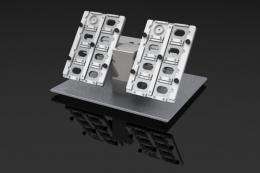Platform for in-vitro study of brain tissue developed by Imec and PEIRA

The nanoelectronics research centre imec and Peira, a Belgium-based manufacturer of pharmaceutical and chemical research instruments, jointly developed an innovative slice-tilting instrument for in-vitro research on brain tissue. The new tool enables long-term studying of brain cultures through electronic stimulation and read-out, essential in getting insight into the functioning of the brain.
To increase knowledge on neuronal networks, on how our brain works, and on the cellular processes causing neurodegenerative diseases such as Alzheimer’s disease, brain tissue slices need to be investigated for a longer time. To keep brain tissue slices alive to study long-term effects in neuronal circuits, the slices have to be cultured. They have to attach to a substrate and start growing. Such a brain tissue culturing procedure is as a very difficult and precise manipulation, and it is believed to be one of the most challenging cultures known in the medical world. Therefore, imec has developed together with Peira, a custom slice-tilting device containing up to 16 chips with stimulation and read-out electronics, especially customized to grow brain slice tissue on. The tilting device is fully incorporated in a cell growth incubator. Parameters such as tilting angle, speed and interval time can be programmed to obtain optimal growth, survival and functionality of the brain slice. The new tool ensures optimal growth of brain slices on the chips for more than a month. It enables in-vitro investigation of long-term processes in brain circuits.
“With its research into lab and preclinical instrumentation, imec aims to play an important role in developing powerful healthcare diagnostics and therapy,” says Kris Verstreken, Program Director Life Sciences at imec. Imec’s experience in nano- and microsystems technology is at the basis of innovative devices and instruments for the pharmaceutical industry. Imec has been developing novel techniques and protocols for brain slice culturing on multi-electrode array and microchip surfaces. Part of this innovation is the concept for a new slice tilter device for the culturing process. “This in-vitro brain tissue research instrument is an example of how our technology can support medical research into areas such as neurology, cardiology or oncology, interacting not only at the level of the individual cell but also capturing the complexity of cellular networks, tissues or organs. For the practical implementation of the slice tilter device, imec and Peira have joined forces.”
“We share a believe at Peira that breakthrough research will often need novel and unique instruments to create new insights,” says Hans Nicasy, founder and managing director at Peira. This brain tissue instrument is a nice illustration of how Peira solves the researcher’s problem by integrating good engineering practices into an efficient and effective apparatus. The slice tilter platform was developed in close cooperation between the researchers at imec and Peira’s engineers. Peira supplies scientists in academia and the biotech and pharmaceutical industries with innovative instruments and co-develops customized research platforms that help to create new insights in the pathways of neuro diseases such Alzheimer and Parkinson or help to develop new cancer diagnostics or therapy tools.”














